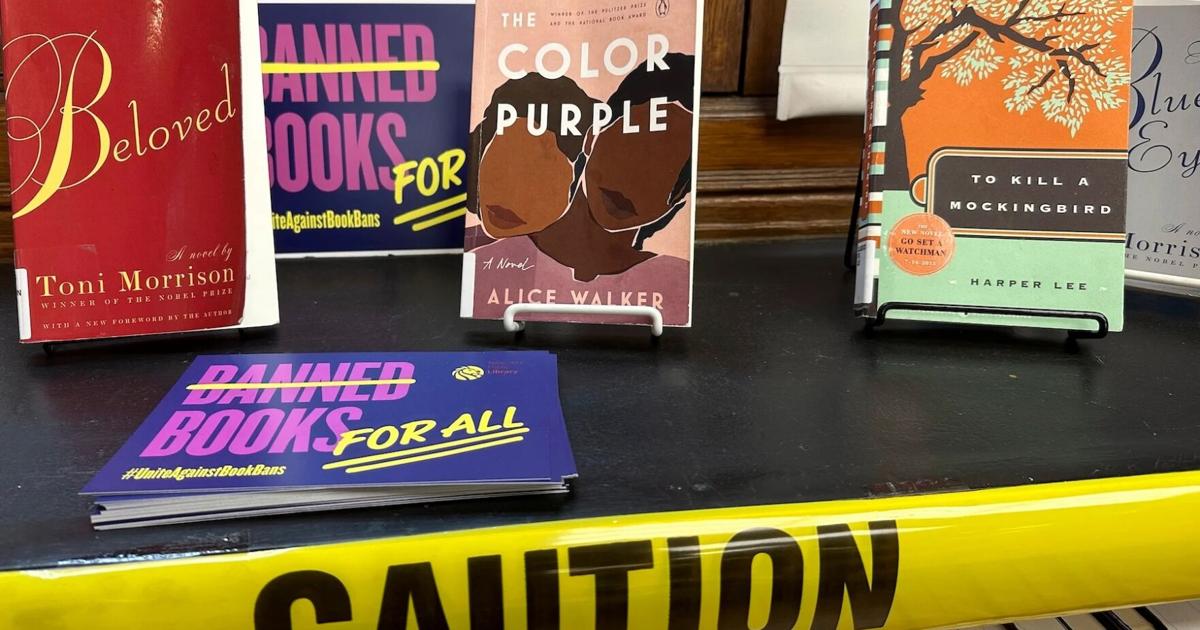Riding home to Delaware on a train from Washington, D.C., last year, state Rep. Krista Griffith buried her nose in her novel of the moment. Her seatmate, a stranger, was also engrossed in a book. The two soon struck up a conversation about their lifelong love of reading.
Griffith, a Democrat who represents suburbs north of Wilmington, learned her literary compatriot was Kasey Meehan, who heads the nonprofit PEN America’s Freedom to Read program—a national campaign to oppose book bans. Meehan told the Delaware lawmaker about how the group had helped create laws in about a dozen states to counter bans of books in schools and public libraries.
Those laws are a response to recent moves—almost all by conservative Christian groups and politicians—to remove mostly books whose themes include LGBTQ+ issues, America’s racist history, or sex, Meehan explained. The targeted books range from picture books for preschoolers to novels for high school seniors.
“See, here we were, sitting next to each other, and she told me about how she had just been in Maryland for the bill signing that Governor [Wes] Moore was doing on a Freedom to Read bill,” Griffith recalled last week in an interview with WHYY News. “So that sparked my interest in actually getting legislation passed in Delaware.”
That serendipitous meeting on the rails led to last week’s signing by Delaware Gov. Matt Meyer of a bill that Griffith ushered through the General Assembly this year. The new law ensures that books and resources cannot be removed or banned from school and public libraries based on the author’s background or because of partisan, ideological, or religious objections.
The law also requires school boards to establish a clear process for reviewing complaints about library materials and mandates that books and other items under review remain available until a decision is made. Only students, parents, guardians, or employees can object to what’s in that school’s collection.
Appeals of decisions can be made to a new statewide School Library Review Committee. Members include the state librarian, education secretary, and presidents of the state teachers’ union as well as the school administrators, school librarians, and state library associations.
The Democrat-sponsored legislation passed mostly along partisan lines, with almost all Republicans voting against it.
Meehan, based in Philadelphia, said in an interview that she’s gratified to have helped inspire Delaware lawmakers to protect the right of students and the community to decide what they want to read.
“As PEN America has been tracking this for the last four or five years, we have seen a really strong influence of outside pressures,” Meehan said. “That could be state legislatures calling on districts to remove certain books. It could be special interest groups that are well-funded and well-coordinated, putting pressure on districts that do not have any children in that particular school.”
### ‘Imposing a very narrow belief of what is and is not okay’
PEN America has documented nearly 16,000 book bans in public school libraries since 2021. Among the banned titles are *All Boys Aren’t Blue,* George M. Johnson’s memoir of growing up as a gay Black man in New Jersey and Virginia; *Nineteen Minutes,* Jodi Picoult’s novel about a shooting in a rural New Hampshire school; and Sarah S. Brannen’s picture book *Uncle Bobby’s Wedding,* which tells the story of a girl worried that her favorite uncle will no longer have time for her after he marries his boyfriend. Notably, in its original 2008 version, the characters were guinea pigs.
“The current wave of book banning is certainly coming from the right,” Meehan said. “And what they are imposing on school systems and public libraries is a very narrow belief of what is and is not okay in those systems.”
Annie Norman, Delaware’s state librarian and a key architect of the bill, embraces the new process.
“In Delaware’s case, it’s more about heading off problems,” Norman said. “Let’s make sure we don’t have problems, and it’s protecting the staff as well.”
Norman especially appreciates that the law forbids schools and school boards from disciplining or retaliating against librarians for doing their jobs.
“In other states, librarians have been locked up for some of this,” she noted.
Gov. Meyer, a lawyer and entrepreneur who also taught middle school math in a Delaware public school, lauded the law in a written statement.
“Freedom of expression and access to diverse ideas are the bedrock of a strong democracy,” Meyer said. “Our libraries remain places where every child can explore, learn, and see themselves reflected in the stories they read. Our communities are stronger when we engage with ideas, not erase them.”
Sen. Tizzy Lockman, a Wilmington Democrat who co-sponsored the bill, said it’s a critical step for Delaware to take.
“This is not so much about banning the banning of books, but really about making sure there was due process in place for concerns to be raised about material and a clear path to resolve those concerns,” Lockman said. “It was about reading the national climate of polarization and wanting to handle that in the way we would like to think we handle things in Delaware. This made all the sense in the world—to have that in place when it comes to the materials students have access to in our libraries.”
Griffith said the bottom line for her is that libraries should be places where kids and adults can explore a wide range of concepts and viewpoints, even if others disagree with them.
“We want them to be a place of freedom—to choose to read and to have access to ideas and other people’s views on anything from their worldview to how they live their lives,” Griffith said.
https://www.phillytrib.com/news/state_and_region/delaware-bans-book-bans-based-on-author-s-background-or-partisan-ideological-or-religious-objections/article_b5565a16-17bc-4ba4-8ead-b2d1b667adf9.html



